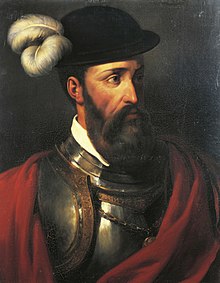Francisco Pizarro González
|
Marquess Francisco Pizarro |
|
|---|---|

Portrait of Francisco Pizarro by Amable-Paul Coutan, 1835
|
|
| Governor of New Castile | |
|
In office 26 July 1529 – 26 June 1541 |
|
| Monarch | Charles I |
| Succeeded by | Cristóbal Vaca de Castro |
| Captain General of New Castile | |
|
In office 26 July 1529 – 26 June 1541 |
|
| Personal details | |
| Born |
c. 1471 or 1476 Trujillo, Crown of Castile |
| Died | 26 June 1541 (aged 65–70) Lima, New Castile |
| Spouse(s) | Inés Huaylas Yupanqui |
| Children | Francisca Pizarro Yupanqui |
| Signature |  |
| Military service | |
| Allegiance |
|
| Years of service | 1496–1541 |
| Battles/wars | Spanish conquest of the Inca Empire |
Francisco Pizarro González (/pɪˈzɑːroʊ/; Spanish: [piˈθaro]; c. 1471 – 26 June 1541) was a Spanish conquistador who led an expedition that conquered the Inca Empire. He captured and killed Incan emperor Atahualpa, and claimed the lands for Spain.
Francisco Pizarro was born in Trujillo, Cáceres, Spain (then in the Crown of Castile) in modern-day Extremadura, Spain. He was the illegitimate son of infantry colonel Gonzalo Pizarro (1446–1522) and Francisca González, a woman of poor means. His date of birth is uncertain, but it is believed to be sometime in the 1470s, probably 1474. Little attention was paid to his education and he grew up illiterate.
His father was a colonel of infantry who served in Navarre and in the Italian campaigns under Córdoba. His mother married late in life and had a son Francisco Martín de Alcántara, who was at the conquest of Peru with his half-brother from its inception. Through his father, Francisco was a second cousin, once removed, of Hernán Cortés.
On 10 November 1509, Pizarro sailed from Spain to the New World with Alonso de Ojeda on an expedition to Gulf of Urabá in Tierra Firme. Pizarro became a participant in Ojeda's failed colony, commanding the remnants until he abandoned it with the survivors. He sailed to Cartagena and joined the fleet of Martín Fernández de Enciso in 1513.
...
Wikipedia
